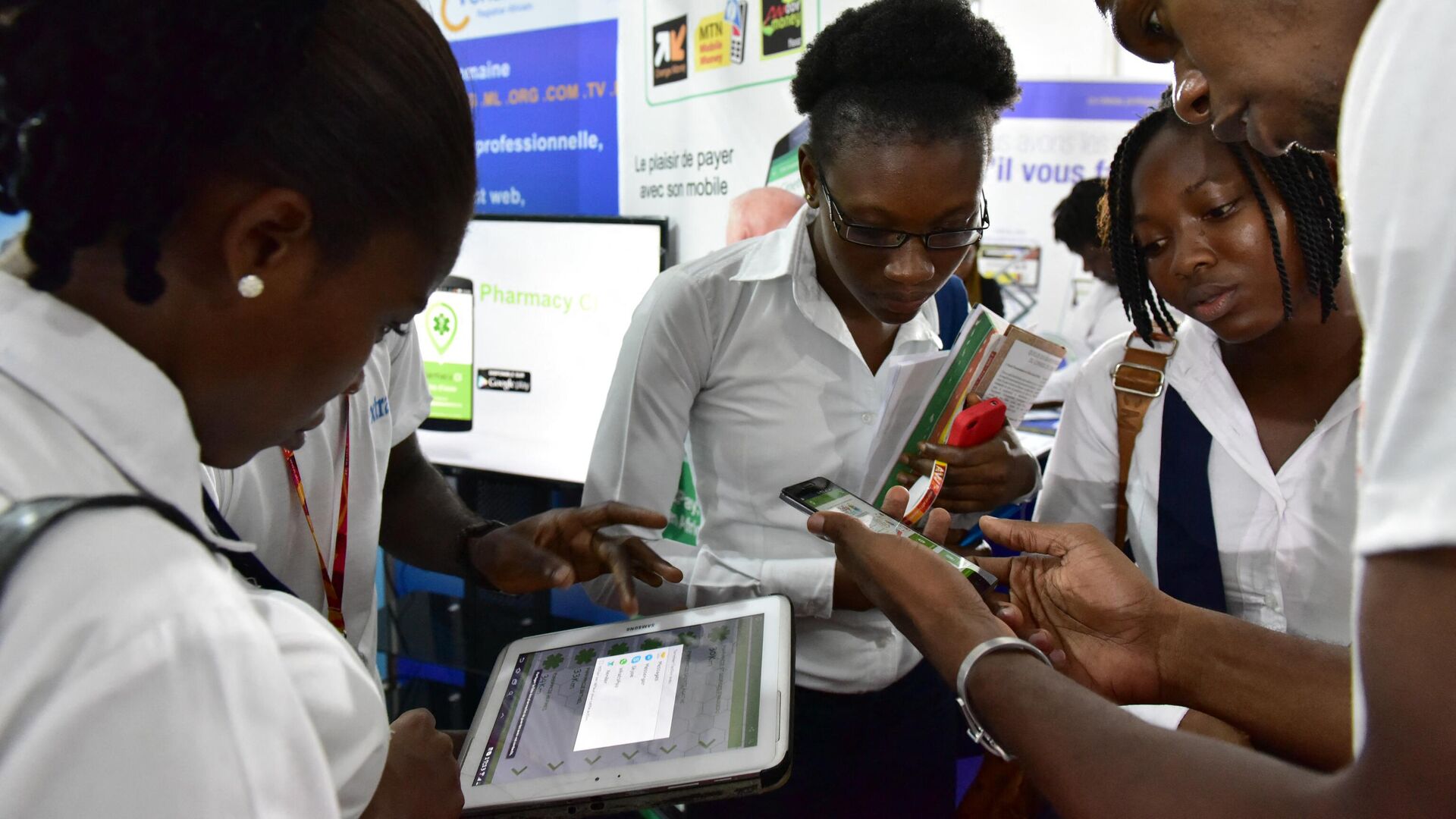https://en.sputniknews.africa/20231025/development-information-day-kenyas-experience-in-transformative-digital-technologies-1063074666.html
Development Information Day: Kenya's Experience in Transformative Digital Technologies
Development Information Day: Kenya's Experience in Transformative Digital Technologies
Sputnik Africa
Since 1972, the UN has celebrated October 24 each year as the World Development Information Day. According to the organization, the purpose of the day is to... 25.10.2023, Sputnik Africa
2023-10-25T20:14+0200
2023-10-25T20:14+0200
2023-10-25T20:19+0200
sub-saharan africa
united nations (un)
information and communication technology
information
development
east africa
technology
digital technology
https://cdn1.img.sputniknews.africa/img/07e7/0a/19/1063078675_0:321:3068:2047_1920x0_80_0_0_ebcf7630daa100a1eccea56d88c7b494.jpg
On the World Development Information Day, an official and an expert from Kenya told Sputnik Africa about transformative potential of modern digital information and communication technologies and their role in tackling development challenges faced African nations.Developed in East African country, the pioneering mobile money service M-PESA has simplified money transfers across urban and rural areas, enabling individuals to send funds effortlessly to different parts of the East African region.M-Pesa is a mobile phone-based money transfer, payment, and microfinance service launched in 2007 by Vodafone and Kenya's largest mobile operator, Safaricom. M-Pesa has since expanded to several other African countries, including Tanzania, Mozambique, DRC, Lesotho, Ghana, Egypt, South Africa, and Ethiopia, as well as Afghanistan, India, Romania, and Albania.Jonathan Misoi, Chief Officer of ICT and E-Government Department of Nandi County, told Sputnik Africa about his county as an example of successful implementation of modern digital technologies. The official highlighted several initiatives that have transformed governance, services, transparency, and citizen engagement.These include a Revenue Management System for efficient tax collection, a Health Management Information System that enhances healthcare delivery, an Agricultural Management Information System benefiting farmers, an Open Data Platform promoting transparency, and a Toll-Free Call Centre facilitating citizen engagement.Additionally, a forthcoming Chatbot for data interpretation and an Open Contracting Platform for transparent procurement are in the pipeline.Speaking of the potential of digital information and communication technologies (ICTs) in tackling Kenya's current development challenges, Misoi emphasized their wide-ranging benefits.In his turn, Katana emphasized the positive influence in the agricultural sector, which is a key pillar of the Kenyan economy.According to Katana, the adoption of technology in agriculture has resulted in increased food production, improved food security, and subsequently facilitated overall development efforts.Empowering CommunityA well-informed populace leads to better understanding and appreciation of the diverse offerings of various nations, encouraging travelers to explore different African countries beyond their initial destinations, according to Katana. He stressed that by sharing information, African countries can foster cooperation, strengthen diplomatic ties, and promote tourism.Misoi identified digital technologies as powerful tools for promoting accessibility, real-time interaction, transparency, accountability, citizen feedback loops, data-driven decision-making, and community empowerment.Misoi also addressed the challenge of misleading information in major media outlets. He suggested various efforts that can be made to tackle this problem. These include media literacy education, crowdsourced fact-checking and verification, responsible reporting, media regulations and laws, among others.As for Katana, he believes that technological advancements allow for improved awareness campaigns on topics such as gender equality, advocacy for social and economic development, and overall community empowerment.He added that through harnessing technology, public opinion can be effectively channeled towards meaningful dialogues and decision-making processes.The Kenyan expert acknowledged the significant role played by social media in shaping public opinion. While social media platforms offer immense opportunities for communication and information sharing, they can also serve as breeding grounds for misinformation.
https://en.sputniknews.africa/20231021/kenya-made-smartphones-to-reach-market-in-late-october-1062968370.html
https://en.sputniknews.africa/20230821/scientists-working-on-ai-tools-that-speak-african-languages-1061493013.html
east africa
Sputnik Africa
feedback@sputniknews.com
+74956456601
MIA „Rossiya Segodnya“
2023
Muhammad Nooh Osman
https://cdn1.img.sputniknews.africa/img/07e7/04/0a/1058467512_0:0:1280:1280_100x100_80_0_0_ec723833bcbfcaed2e21952965ad99e4.jpg
Muhammad Nooh Osman
https://cdn1.img.sputniknews.africa/img/07e7/04/0a/1058467512_0:0:1280:1280_100x100_80_0_0_ec723833bcbfcaed2e21952965ad99e4.jpg
News
en_EN
Sputnik Africa
feedback@sputniknews.com
+74956456601
MIA „Rossiya Segodnya“
Sputnik Africa
feedback@sputniknews.com
+74956456601
MIA „Rossiya Segodnya“
Muhammad Nooh Osman
https://cdn1.img.sputniknews.africa/img/07e7/04/0a/1058467512_0:0:1280:1280_100x100_80_0_0_ec723833bcbfcaed2e21952965ad99e4.jpg
united nations (un), information and communication technology, information, development, east africa, technology, digital technology
united nations (un), information and communication technology, information, development, east africa, technology, digital technology
Development Information Day: Kenya's Experience in Transformative Digital Technologies
20:14 25.10.2023 (Updated: 20:19 25.10.2023) Muhammad Nooh Osman
Writer/Editor
Since 1972, the UN has celebrated October 24 each year as the World Development Information Day. According to the organization, the purpose of the day is to raise awareness of development problems and the need for international cooperation to solve them, and to mobilize public opinion in support of development goals and policies.
On the World Development Information Day, an official and an expert from Kenya told
Sputnik Africa about transformative potential of
modern digital information and communication technologies and their role in tackling development challenges faced African nations.
"Kenya has actually made significant progress when it comes to modern digital technologies. Kenya actually is one of the pioneer countries when it comes to mobile money services, that is M-PESA, which is actually very common," said Allan Katana, lead digital expert at Ajira Digital Program in Kenya.
Developed in East African country, the pioneering mobile money service
M-PESA has simplified money transfers across urban and rural areas, enabling individuals to send funds effortlessly to different parts of the East African region.
M-Pesa is a mobile phone-based money transfer, payment, and microfinance service launched in 2007 by Vodafone and Kenya's largest mobile operator, Safaricom. M-Pesa has since expanded to several other African countries, including Tanzania, Mozambique, DRC, Lesotho, Ghana, Egypt, South Africa, and Ethiopia, as well as Afghanistan, India, Romania, and Albania.
Jonathan Misoi, Chief Officer of ICT and E-Government Department of Nandi County, told
Sputnik Africa about his county as an example of successful implementation of modern digital technologies. The official highlighted several initiatives that have transformed governance, services,
transparency, and citizen engagement.
These include a Revenue Management System for efficient tax collection, a Health Management Information System that enhances healthcare delivery, an Agricultural Management Information System benefiting farmers, an Open Data Platform promoting transparency, and a Toll-Free Call Centre facilitating citizen engagement.
"Nandi County has implemented a digital Revenue Management System, which has streamlined tax collection processes. This technology allows citizens to pay their taxes online and provides government officials with efficient tools to manage and track revenue collection," Misoi shared.
Additionally, a forthcoming Chatbot for data interpretation and an Open Contracting Platform for transparent procurement are in the pipeline.
Speaking of the potential of digital information and communication technologies (ICTs) in tackling Kenya's current development challenges, Misoi emphasized their wide-ranging benefits.
"ICT can promote transparency in government operations. Open data platforms, e-government services, and digital records management can reduce corruption and improve accountability in the public sector," the Nandi County official said, adding that ICTs can improve access to education, healthcare services, and agricultural information.
In his turn, Katana emphasized the positive influence in the agricultural sector, which is a key pillar of the Kenyan economy.
"In Kenya, agriculture hasn't been left behind. We've seen people have actually now embraced technology in agriculture. People have actually now started using technological devices to try and find out if there are new diseases and also come up with ways of actually mitigating those diseases when it comes to crop diseases and even animal diseases," said the digital expert.
According to Katana, the adoption of technology in agriculture has resulted in increased food production, improved food security, and subsequently facilitated overall development efforts.
"With food security, then you get to realize that even development of other infrastructure and other issues becomes easier," Katana said. "So I'd say that the digital information in Kenya has actually helped tackle the development challenges nowadays."
A well-informed populace leads to better understanding and appreciation of the diverse offerings of various nations, encouraging travelers to explore different African countries beyond their initial destinations, according to Katana. He stressed that by sharing information, African countries can foster cooperation, strengthen diplomatic ties, and promote tourism.
Misoi identified digital technologies as powerful tools for promoting accessibility, real-time interaction, transparency, accountability, citizen feedback loops, data-driven decision-making, and community empowerment.
"The use of modern technology enhances e-government initiatives, facilitating citizens' participation in governance. Citizens can engage with government services and express their views on development issues through digital platforms, promoting civic engagement," Misoi said.
Misoi also addressed the challenge of misleading information in major media outlets. He suggested various efforts that can be made to tackle this problem. These include media literacy education, crowdsourced fact-checking and verification, responsible reporting, media regulations and laws, among others.
"Teaching critical thinking skills and the ability to evaluate sources can empower individuals to discern reliable information from misinformation," the official said. "Journalists and media outlets should prioritize verification and accuracy in their reporting."
As for Katana, he believes that technological advancements allow for improved awareness campaigns on topics such as gender equality, advocacy for social and economic development, and overall community empowerment.
He added that through harnessing technology, public opinion can be effectively channeled towards meaningful dialogues and decision-making processes.
"When it comes to mobilizing public opinion on social and economic development issues, I agree that modern technology plays a vital role," Katana said. "It actually ensures that we have things to do with advocacies, social and economic development and all that."
The Kenyan expert acknowledged the significant role played by social media in shaping public opinion. While social media platforms offer immense opportunities for communication and information sharing, they can also serve as breeding grounds for misinformation.
"Because it is hard to control what people post on social media, we've gotten to see the disadvantages of it, which also includes misleading information being put out there," he concluded. "So I also believe that the civil society and other organizations also play a very big role when it comes to information that is being put out to the public by the different media outlets."




